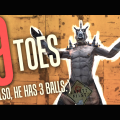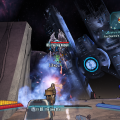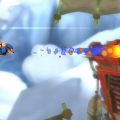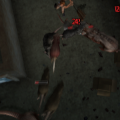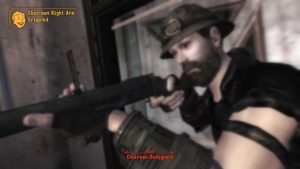New Vegas might at the first sight look like just another expansion to Fallout 3 (it uses the same engine and a lot of the same graphical assets) but it is in fact a separate full-length game. Despite being powered by the same technology and having very similar graphics, it’s also designed in a very different way. This is because it was not made by Bethesda but by Obsidian, a studio known for such titles as Knights of the Old Republic 2, Alpha Protocol and more recently Pillars of Eternity.
Opinions on this game are sharply divided, with fans of Bethesda’s take on the series criticizing it as a less polished Fallout 3 while those who prefer the older games seeing it as the closest thing to a new Interplay Fallout. There’s a reason for that: many of the Obsidian employees used to work in Black Isle Studios and New Vegas credits include some familiar names like Josh Sawyer or Chris Avellone. The game also revisits many of the ideas from cancelled Van Buren project, as well as a quest with a Vault overrun by hostile plans which might be based on the idea for Fallout Tactics 2.
Like old Fallout games, New Vegas focuses on player agency, non-linear narrative and character building. The game has a plenty of skill checks, quests with multiple different solutions and less combat (this made it possible to play the whole game without killing anyone but also led to some players being disappointed by a world which can feel empty in comparison). It also marks the return of classic Fallout-style ending with multiple (interconnected like in Fallout 2) segments showing how the fates of different places and characters were affected by the protagonist’s decisions.
New Vegas is a game even more focused on faction politics than Fallout 2 was. One of the most important plot points is the conflict between New California Republic and Caesar’s Legion – a ruthless army which conquered many of the smaller tribes and enforced cruel laws based on a strict moral code. The eponymous New Vegas is a strategic target for both nations but its current ruler – a reclusive Mr. House who is said to be so old that he lived before the war – will do anything to stay in power. If the player dislikes all the factions (and each of them gives you reasons to hate them), it’s also possible to go against everyone and fight for independent Vegas, with a potential for an extremely satisfying conclusion in which the protagonist uses diplomacy and a few threats to convince the game’s most powerful armies to leave Vegas. The game also features many smaller factions, each with a Fallout 2-style reputation meter, although with slightly more complex mechanics: positive and negative actions don’t cancel each other out, giving the protagonist one of many mixed reputations instead which makes the characters think of you as someone unpredictable and not very trustworthy.
New Vegas begins with its protagonist – The Courier – getting shot in the head and having his delivery – a single casino chip – stolen from him. After being nursed back to health by a doctor from the town of Goodsprings, he sets out to the Mojave Wasteland to look for the people who tried to kill him: two members of the Great Khans gang (implied to be related to raiders from the first Fallout) and a man in a checkered suit. The journey will lead him through a world which can be best described as a post-apocalyptic Wild West – complete with radios playing old country songs – to the city built on the ruins of Las Vegas where gamblers, criminals, prostitutes and shady businessmen live in the shadow of the approaching war. It’s probably the best main story in the series, with a natural progression from a personal quest for revenge to an epic conflict which is as much about power and resources as it is about philosophical differences.
One of the best things about the plot of New Vegas is Caesar’s Legion. Not only does the game manage to find a non-ridiculous justification for the existence of a group of people who pretend to be ancient Romans, it also makes them interesting. While Legion is undeniably evil, they’re not just a bunch of assholes who kill people for fun. When early in the game members of the Legion slaughter a whole village and one of them makes a speech about moral failings of their victims while urging you to tell everyone about what happened so that it becomes a warning to everyone else, it’s difficult not to feel at least a bit of hatred for people who accepted money to betray a local gang and didn’t care about their friends and families dying as long as they had a chance to survive. While many players will end up fighting against Caesar and the things he stands for, the game’s writing makes it possible to understand why some people find strong leaders, strict ethics, and harsh punishments more appealing than the democratic ideas of NCR, cold pragmatism of Mr. House or the chaos that comes from rejecting all the established powers and forging your own way. They have exactly the kind of bad ideas that would get traction in a lawless wasteland because they’re a sort of counterpoint to everyone else there.
Sidequests related to different towns are more or less a standard Fallout fare with communities having trouble with raiders (although this item each raider group is given a bit of focus and a backstory), mutated animals and other such nuissances. It becomes much more interesting while factions become involved – a town of Freeside for example has a conflict between a local gang and the New California Republic soldiers stationed nearby while a group of Followers of the Apocalypse tries to keep peace and help those in need. Still, all of those sidequests are overshadowed by the stories given to your companions who include a cybernetic dog with a brain disease, an alcoholic owner of a destroyed caravan (who is also a daughter of one of the companions from Fallout 2), a super mutant struggling with memories of her human past and a few others. Helping those well-written characters is immensly satisfying, although the enjoyment is hampered slightly by the fact that like in Fallout 2 you can have only one humanoid and one non-humanoid companion at time.
Like Fallout 3, New Vegas can be supplemented with DLC packs. The game’s four add-ons, despite each of them having a different mood and style, come together to form a a single story arc which sheds some light on Courier’s past and provide a different interpretation of some of the aspects of the game’s world. They’re also connected by a central theme: characters being haunted by the past which can range from traumatic events from their own lives to an obsession with ‘old world’ (that is, the world before the nuclear war). Unfortunately, they’re not as fun to play as the vanilla game, with tedious fights against the enemies with inflated health being a common problem (especially in a sci-fi themed Old World Blues which will eat through both your ammo reserves and your patience).
New Vegas features several improvements to the gameplay of Fallout 3. Third person view is now slightly more useful (although still not convenient enough to use). Guns can be loaded with different ammo for different effects. Most importantly, the game can be played in ‘hardcore mode’ in which healing is more difficult (health-restoring items work gradually, crippled limbs must be healed with special items) and the player must eat, sleep and drink to stay alive. It’s such a great idea which makes the game so much deeper, more challenging and more immersive that other games in the series seem incomplete without it.
Unfortunately, New Vegas is an extremely buggy game. Crashes, getting stuck in terrain, graphical glitches and problems with quest triggers (in a certain quest, you have an option of joining up with a temporary companion in a heavily irradiated village but he doesn’t spawn due to a bug, making you pointlessly accumulate radiation). Some of the most glaring bugs have been fixed (and unlike Fallout 3, the game doesn’t have too many problems with modern computers) but the game is still far from stable, significantly reducing the enjoyment.
All in all, Fallout: New Vegas is a great game and a worthy successor to Black Isle’s classics. Despite not being a mainline title, it is truer to the series’ roots than anything by Bethesda – it’s more of a Fallout title than the actual Fallout 3 which would fit better as a spin-off game. While it’s not a perfect title, it modernizes the Fallout formula without dumbing it down and it’s probably the closest we’re going to get to Van Buren.










